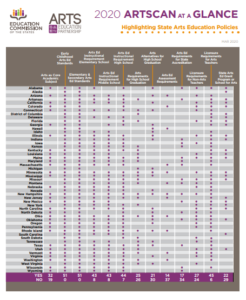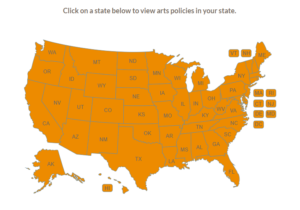Did you know that Nevada has arts education instructional requirements for K-12 public schools, youth centers, state facilities and detention centers? Neither did I, until I joined the team at the Arts Education Partnership and began working on ArtScan. As part of AEP’s new work exploring the arts across the juvenile justice system, I’ve been researching what arts education opportunities are available for justice-involved youth and found through ArtScan that Nevada is one state addressing this topic.
This is just one example of the breadth of information included in ArtScan, the nation’s clearinghouse of the latest state policies supporting arts education from all 50 states and the District of Columbia.
ArtScan, an easy-to-use database, includes up-to-date information on 14 policy areas related to K-12 arts education such as standards, instructional requirements, graduation requirements, assessment, state accreditation, teacher-licensure requirements and funding. Each year, in collaboration with the State Education Agency Directors of Arts Education (an AEP partner organization), AEP updates this database and provides multiple ways for users to explore the data:
ArtScan also allows a user to see a comprehensive 50-State Comparison across specific policy areas.
New in 2020
All 50 states and the District of Columbia have adopted arts education standards for early childhood, elementary and secondary education, and many state boards have recently updated them. Here are some of the updates captured in ArtScan this year:
- Arkansas added an arts graduation requirement of 3.5 units, with eligible courses including music and fine arts. Twenty-five states have adopted policies for arts education requirements for high school graduation, but most states have a high school graduation requirement of 1 unit
- Minnesota added language that specifically includes media arts both in subject requirements and other policies, including grade-level benchmarks. You may already know that the National Core Arts Standards include media arts as a fifth arts discipline, and Minnesota’s policy is one example of how these new standards are influencing states beyond revisions to academic standards.
- Missouri and South Dakota added arts-related licensure requirements for early childhood and elementary teachers, meaning that teacher preparation coursework for these certifications must include the arts. Missouri and South Dakota are among the 27 states that have arts licensure requirements for non-arts teachers within state statute or regulation.
Navigating ArtScan reveals many changes in policies related to arts education across the country. From expanding language to include new art forms, to teacher credentialing and arts requirements, ArtScan is your one-stop shop for information that can help ensure that all students have access to an excellent arts education. Explore arts education policies in your state and compare with others!








